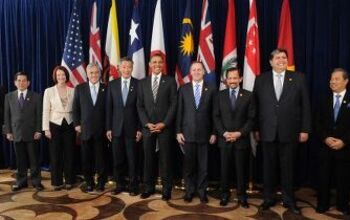Trans-Pacific Partnership Details Released

The full text of the Trans-Pacific Partnership (TPP) was released Thursday by pact member New Zealand. The trade agreement will set out trade rules for multiple industries — including automotive manufacturing and the import/export of those vehicles — for its member states.
TPP, an expansion of the Trans-Pacific Strategic Economic Partnership Agreement, includes members Australia, Brunei, Canada, Chile, Japan, Mexico, Malaysia, New Zealand, Peru, Singapore, United States of America and Vietnam.
New Zealand leaked the details on its Ministry of Foreign Affairs and Trade website.
Called “a landmark achievement for U.S. President Barack Obama” by Reuters, the deal is not without its critics on both sides of the aisle. Nor is it without opposition in the industry itself.
“Ford supports free-trade agreements that result in real market openings and a level playing field for all to compete,” said Ziad Ojakli, Ford’s group vice president for government and community relations, last month. “Within the U.S. Congress, there is bipartisan consensus that currency manipulation needs to be meaningfully addressed. This summer, U.S. lawmakers took unprecedented action to set a clear negotiating objective for addressing currency manipulation in all future trade deals. The TPP fails to meet that test.”

More by Mark Stevenson


































Comments
Join the conversation
"Corporations can sue states in 'private' courts Moreover, if a foreign firm feels that a new law passed by a state impacts its rights under the TPP agreement, it could challenge the country’s decision in the private arbitration system. https://www.rt.com/usa/245093-tpp-corporations-suing-states/ Now we know why the corporations and the Obama administration want the TPP, a huge "trade" agreement being negotiated between the United States and 11 other countries, kept secret from the public until it's too late to stop it. The WikiLeaks analysis explains that this lets firms "sue" governments to obtain taxpayer compensation for loss of "expected future profits." http://www.huffingtonpost.com/dave-johnson/now-we-know-why-huge-tpp_b_6956540.html Good luck, men
The new Canadian federal government just put the whole thing online. It's some 6000 pages, so it may take a while for various interest groups to ferret out what's relevant to them. I agree with those who say these agreements are mostly about shifting power from citizens to corporations. Basically, if a transaction makes sense for all involved, no "trade deal" is needed to begin with.
It seems the nations with freer market style economies will benefit the most. Many nations have placed to much protection on manufacturing and agriculture. The most protective nations and the people within those nations should of started reducing taxpayer subsidies, protection, etc. I do know that the Australian agri industry will benefit from any reduction in tariffs, as we don't have to lower any of ours as they are almost nonexistent. The same goes for manufacturing. I would like to see the stranglehold the US pharmaceuticals have on the US consumer reduced greatly. This will make medicine and health much cheaper in the US.
I can't say that I have an inkling of understanding of this trade agreement, and I'm sure that the nuances (loopholes, if you like) will be studied and revealed in "outrage units" by both the left and right to get people PO'd about the whole TPP in general. But, such is the nature with all complex agreements. My wish is that the over-arching desired effect of this deal is to intertwine the global economies to the point that armed conflict is somehow avoided, and differences are negotiated, rather than fought over. Of course, the world of the movie "Rollerball" was peaceful as well, with tight corporate control of the masses, and violent urges personified and restricted to the Rollerball arena (Football/Fütbol, anyone?) Corporate influence over policy (worldwide) has never been higher - people's interest in pols like Liz Warren and Bernie Sanders are like a natural "immune response" to this trend.